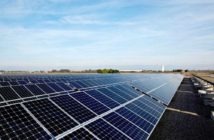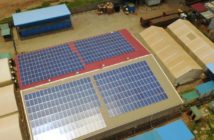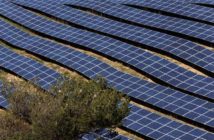BLOOMBERG BUSINESSWEEK
 ACWA Power International, a Saudi energy developer, plans to add solar assets at home and electricity plants abroad to triple production capacity.
ACWA Power International, a Saudi energy developer, plans to add solar assets at home and electricity plants abroad to triple production capacity.
ACWA is targeting 38,000 megawatts by 2017, equal to almost half Saudi Arabia’s planned total capacity that year. The Riyadh-based company, with current capacity of 13,000 megawatts, is seeking to get 10 percent of its output from clean-energy sources in the Middle East and Africa, Chief Executive Officer Paddy Padmanathan said in an interview.
“We will build capacity in all fuels, including renewable power, in all our target markets,” the CEO said. ACWA is focusing on countries in the Gulf Cooperation Council, as well as Jordan, Egypt, Turkey and southern Africa, he said, adding that its “significant” renewables market will be Saudi Arabia.
The kingdom is expanding efforts to diversify its sources of energy as economic and population growth threaten to erode its status as the world’s biggest oil exporter. By investing in renewables, the country can cut domestic use of fossil fuels and free up volumes for export. Jordan, to the north, lacks such oil wealth and needs alternative options, while Egypt is grappling with burgeoning power consumption as its population swells.
In the Saudi holy city of Mecca, ACWA is among 20 groups bidding to build and operate plants that will produce 385 gigawatt-hours of power a year, including 100 megawatts of solar capacity. The tender is one of several that have attracted the company this year as it expands its renewable-energy ambitions.
“A target of 10 percent renewable indicates a requirement for multiple large-scale projects,” said Phil Dominy, assistant director of energy and environmental finance at Ernst & Young LLP. “The scale of the challenge can be compared to the current program by the South African government.”
South Africa plans to add 3,725 megawatts in renewable- energy capacity by the end of 2016 through a program of bidding rounds, reducing its dependence on coal-fired power.
Saudi Arabia is seeking $109 billion of investment to build a solar industry, which may produce a third of its power by 2032, compared with almost none now. About $136 billion was invested worldwide in solar energy last year, according to London-based researcher Bloomberg New Energy Finance.
While the country’s target is “achievable” it’s a “challenging” task, E&Y’s Dominy said by e-mail.
Solar Target
Saudi Arabia’s 3 megawatts of solar capacity put it behind Egypt, Morocco, Tunisia, Algeria and the United Arab Emirates, according to BNEF. The government is targeting 41,000 megawatts of solar capacity within two decades, saving as much as 523,000 barrels of oil a day, according to King Abdullah City for Atomic and Renewable Energy, the agency developing the plans.
ACWA’s renewables strategy will “almost certainly” focus on solar photovoltaics and concentrated solar power plants, according to Dominy. PV panels convert sunlight into electricity, and concentrated solar power uses mirrors to focus the sun’s rays on a small area.
To reach its 38,000-megawatt target, Padmanathan said ACWA is open to building plants as well as making acquisitions, with its renewables expansion focusing mainly on new sites. The company’s projects are funded by a mix of equity capital and project-finance loans, with equity accounting for as much as 30 percent of the total, Padmanathan said.
ACWA already owns and operates a 60-megawatt PV plant in Bulgaria and is developing two concentrated solar power plants in Morocco and South Africa. The company has two 1.5-megawatt wind farms in Jordan, where it also operates a 1-megawatt biomass plant.
Jordan plans to install 300 to 600 megawatts of solar capacity and 1,000 megawatts of wind by 2020.
To contact the reporters on this story: Wael Mahdi in Manama at wmahdi@bloomberg.net Louise Downing in London at Ldowning4@bloomberg.net
To contact the editor responsible for this story: Reed Landberg at landberg@bloomberg.net







